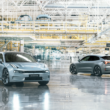Last month, the Ministry of Transport introduced the electronic version of the private vehicle road tax sticker known as the e-LKM, while the electronic version of the Malaysian driver’s licence is known as the e-LMM. But the digital road tax is only applicable for privately owned vehicles. Now, the former Transport Minister, Dr. Wee Ka Siong is asking the government to change to digital car plates as well.
The Star reports that according to Dr. Wee, Malaysia should adopt digital car plates or e-plates with radio frequency identification (RFID) technology.
He pointed out that almost 95% of countries worldwide have already implemented e-plates using RFID technology, while only 5%, including Malaysia, continue to use conventional plates and many neighbouring countries have already implemented e-plates.
Dr. Wee also stated that new car purchases in Malaysia come with an additional charge of RM150 to RM300 to buy acrylic plates. This amount could be used to cover the costs of installing the necessary components in the e-plates. Dr. Wee believes that e-plates can help prevent car theft since RFID technology can enable automatic number plate recognition.
In response to Dr. Wee, the current Transport Minister, Anthony Loke said that if Putrajaya decides to implement the digital car plate or e-plate system, it will not be mandatory for vehicle owners.
He explained that making it mandatory would increase costs for vehicle owners, which could lead to complaints. Furthermore, for existing vehicle owners, there would be additional expenses if they were required to change their car plates.
Loke suggested that the e-plate system might be introduced gradually, perhaps for new vehicles only. He stated that they would consider this matter along with any system changes.
Besides that, Dr. Wee also called for the “digitalisation at the JPJ”, citing JPJ’s MySikap system is based on a “mainframe” system, which had been in place for over 20 years.
Loke mentioned that the digitalisation department of the ministry is currently exploring the possibility of transitioning from their current mainframe IT system to a cloud-based system.










